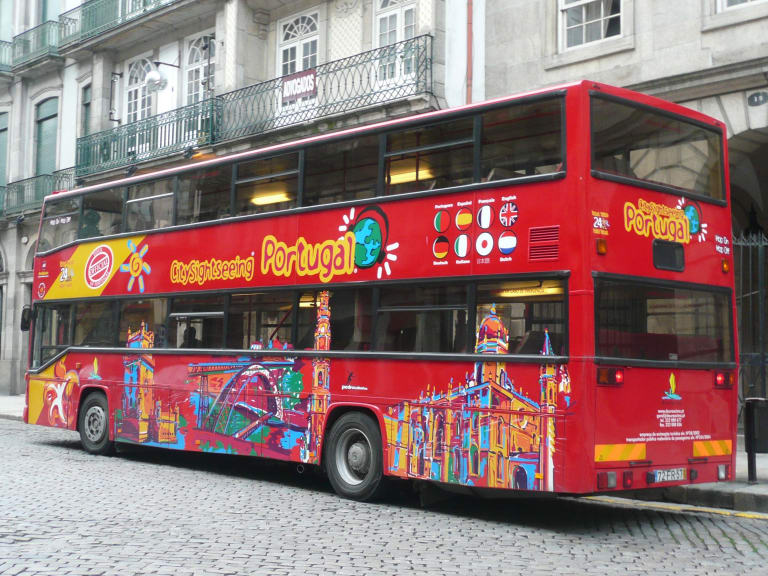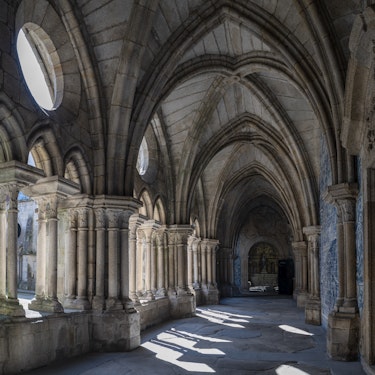More about: Porto in 3 Days: a guidebook for getting the most out of your visit
In Porto you will find a city with a great historical heritage and plenty to see and do. From a stroll with the best views of the river, to enjoying Portuguese gastronomy and discovering the narrow cobbled streets of La Ribeira, its historic centre declared a World Heritage Site in 1996. In three days you will be able to see enough to get the best of the Portuguese city and enjoy the most varied plans. Take note of this guide with the essentials.
Day 1: Stroll around the centre of Oporto

The best way to start your trip to Porto is to visit some of the most emblematic and popular places. That's why your first day will be all about history, culture, breathtaking views and some wineries, to get the best first impression of the city. You will visit the mythical Bolhao Market, the popular Sé Cathedral, the Stock Exchange Palace, the Church of San Francisco, have a bite to eat at Cais da Ribeira, cross the Don Luis I Bridge and appreciate the best views from Serra do Pilar.
Take a stroll through Bolhao Market
Your first stop is the Bolhao Market. This emblematic market in the city of Porto opens its doors early, so from 7am you can already enter and it's well worth a visit. Its construction is very characteristic, typical of neoclassical architecture, and the vendors are distributed over two floors.
In this market you will find all kinds of fresh produce such as meat, seafood, fruit and vegetables, restaurants, flower and plant shops and bakeries, where you can have breakfast or take a coffee and something to eat while you continue your tour of the city. An ideal plan before booking a guided tour of Porto.
Get to know the Sé Cathedral and its Cloister
This Cathedral and its Cloister are two must-see places in Porto and are about a 10-minute walk from the Bolhao Market.
The construction of the mythical Sé Cathedral dates back to the 12th century, although it was renovated several times later, housing a mixture of different styles: Baroque, Romanesque and Gothic. The Cloister was built in the 4th century, its tile decoration tells some religious scenes from history and you can access it directly from inside the Cathedral. For this, I recommend you to book your tickets for the Cathedral of Porto in advance.
In addition, another reason why you can not miss this historic site is because the Sé Cathedral was declared a National Monument and knowing it you will understand why. The price in Hellotickets is from 4 € and the opening hours are:
- From 9am to 12:30am.
- From 14:30 to 19:30 in the afternoon.
Visit the Stock Exchange Palace
The Stock Exchange Palacewas formerly a former convent of St. Francis until the mid-19th century and today is one of the most important and visited architectural beauties of Porto, classified as a National Monument. You can reach it from the Sé Cathedral in about 5 minutes on foot. You can visit it with a guided tour to get to know it in depth and access:
- Courtyard of the Nations.
- Arab Hall.
- Library with more than 10,000 books.
- The Presential Room.
You must book in advance on the official website of this attraction. Also, please note that, for this and other attractions, you can enjoy a discount on your ticket if you book Porto Card with public transport.
Admire the unique style of St. Francis Church

Next to the Palacio de la Bolsa, which was once the convent of St. Francis, the Church of St. Francis still stands. It is one of the most popular religious monuments and was built at the beginning of the 14th century. It has Romanesque and Gothic elements, as well as a Baroque style interior, where it is said that more than 300 kilos of gold dust were used.
Under the floor of this church, some of the Franciscan friars and some members of noble families of Oporto are buried. Your visit also includes a tour of these catacombs and its museum. You can take the opportunity to visit it as part of a bike tour of Porto.
Stop at Cais da Ribeira for a bite to eat.
After this historical tour of Porto and before crossing the bridge to continue with the first day of your visit, I recommend you to have something to eat in Cais da Ribeira, the most touristic and picturesque area of Porto, to recharge your batteries.
There you will find a great gastronomic offer, but I would definitely recommend Taberna Dos Mercadores, another Portuguese restaurant with an abundant variety of dishes.
Food is something very characteristic of Porto, so I leave you with this guide so that you can find out about the best gastronomic tours in the city and include some in your itinerary. But if you prefer something more international, you can always book a menu for the Hard Rock Cafe.
Cross the Don Luis I Bridge
The first day will continue walking over the bridge that crosses the waters of the Douro River and connects Porto with Vila Nova de Gaia. The Don Luis I Bridge was built in 1886, making it one of the most emblematic sites of the city. Its history dates back to the 19th century, when there was a great commercial growth and the connections between Miragaia, a fishermen's neighbourhood on the banks of Porto, and Vila Nova da Gaia, on the other side of the Douro River, had to be reinforced.
The bridge has an imposing iron arch for which many tons of material were used and two floors, one through which the Porto metro circulates and the one below through which vehicles pass. With 400 metres long, this bridge has become a symbol of Porto and its views are magnificent to appreciate the Ribeira. You can cross it on foot or by sailing across the waters of the Douro River. To do so, don't hesitate to book a Porto cruise.
Enjoy good wine in a winery in Vila Nova de Gaia
It would be a sin to leave Porto without visiting one of its characteristic wineries, and on the Gaia side you have plenty to choose from. Personally I recommend Cálem or Sandeman.
And if you want more comfort, don't forget to book a visit to a winery, with fado show and wine tasting and live the full experience.
Don't miss the best views of Porto from Jardím do Morro and the Miradouro da Serra do Pilar
Jardím do Morro is the highest point in Gaia and I recommend you to go up there to marvel at the best views. There is also a lake and a wide variety of local wildlife.
You can rent a bike in Porto or you can take a cable car from the Super Bock square in Cais de Gaia. It is located near Serra do Pilar where there is a viewpoint with the best views of the historic centre of Porto. I definitely recommend you to go up to the viewpoint and take your camera with you to get the best pictures.
End the day with dinner at the Ribeira de Gaia.
Once you come down from the viewpoint, I recommend you finish your first day enjoying good Portuguese food in Ribeira de Gaia:
- Taberninha do Manel, very good option to try typical food in a picturesque restaurant.
- Another possibility to end the day is to book a night tour of Porto with dinner and fado concert
Day 2: Get to know the most emblematic monuments of Oporto

On your second day in Porto, you will continue to see some of the most emblematic buildings, taste typical Portuguese cuisine and take pictures of the best sights of the city. You can visit the mythical Livraria Lello, the Church of Carmen, the famous Clérigos Tower, taste typical Portuguese food, Praça da Liberdade, São Bento station, stroll along rua Santa Catarina and visit Café Majestic.
Visit one of the most emblematic places in Porto: the Lello bookshop
Your second day will start in the historic centre of the city, visiting one of the most essential places in Oporto, the Lello Bookshop, which is considered one of the most beautiful bookshops in the world. It is also the bookshop that inspired the author of Harry Potter, so you can't miss out on booking a Harry Potter tour with tickets to the Lello Bookshop.
If I may, here's a tip. It is one of the most visited places in the city, so I recommend you go early in the morning so that you can get in without any problems and explore it at your own pace. The bookshop is open every day from 9am until 7pm.
Be dazzled by the imposing Carmen Church
Just a few minutes' walk from the Lello bookshop, you'll come to the Church of Carmen, which is one of the most beautiful churches in Porto, with a marked rococo style and built in granite in 1762. Its exterior is beautiful, covered with the typical tiles that dress the whole city, which, in this case, represent the imposition of the scapular on Mount Carmel. You can visit this church every day between 7:30 am and 7 pm.
This second day will start very early, so I recommend you to go to a typical Porto coffee shop located a few metres away from the church, Leitaria da Quinta do Paço. There you can have a coffee and try the classic éclair, which are thin, elongated buns that are baked until they are crispy and hollow and then filled. You'll be spoilt for choice - you'll thank me!
Admire the best views of Porto from the Clérigos Church Tower
The Church of the Clérigos was built in 1748 and together with its Tower, it forms a very recognisable architectural ensemble of the city of Porto. Without a doubt, it is well worth a visit. If you book a guided tour of Porto it is one of the key stops.
The Clérigos Tower is the highest in Portugal, at 76 metres high, and to get there you will have to climb the more than 200 steps. There, you will finally reach one of the best panoramic views of the city of Porto.
Note that the entrance to the Church is free, but to access the Tower and the museum, which houses one of the best museums in Porto, you will have to pay an entrance fee of about €5.
Try a typical francesinha in a Portuguese restaurant.

After walking up and down the stairs of the Clérigos Tower, it's a good time to recharge your batteries and then continue with everything that's left on your second day in Porto. For this, I recommend one of the typical Portuguese meals: a francesinha.
Around the area you'll have a wide variety of places to choose from. I recommend:
- Brasão Aliados, one of the most renowned restaurants.
- Francesinhas Al Forno da Baixa, which also has a very good reputation.
Take a stroll around Praça da Liberdade
Once you've recharged your batteries, you'll have to walk around the area a bit more and the next stop will be: Praça da Liberdade. Just a few metres from the Clérigos Tower, this is Porto's most important square that connects the old and the modern side of the city. In the centre of this square, you will be surprised by an imposing monument of about 10 metres high, the statue of King Pedro IV made of bronze in 1862. If you look closely, you will see that the monarch is holding the Constitutional Charter.
Get to know São Bento train station
São Bento station is an emblem of Porto and is located just a few steps away from Praça da Liberdade.
What's really fascinating about this station is its walls filled with more than thousands of tiles, recreating battle scenes and the history of transport. Tiles are a Porto classic, but this is a work of art. A regular stop if you book a guided tour of Porto.
Go shopping in Rua Santa Catarina
Rua Santa Catarina is a pedestrian street, the most commercial street in Porto, which stretches from the highest part of the city at Batalha Square to Marques de Pombal Square. As you walk along it you can enter the shops to do all kinds of shopping, as well as stroll through the Via Catarina shopping centre.
If you are not a fan of shopping, this walk will also be for you because you will find there the most picturesque facades, such as the one of the small Chapel of Souls, which is covered with the typical blue tiles of Oporto. In addition, you will have restaurants and coffee shops to take a moment to rest.
You should definitely take a break at the Café Majestic, an emblem of the city to feel part of Porto's history. It is an elegant café from the 1920s. Inaugurated in 1921 as Café Élite, it became a venue for meetings of illustrious personalities of the time and a place of inspiration for writers and artists. This café was declared a cultural heritage site in 1983.
End the day in a classic Porto restaurant
To end the second day in Porto, I recommend one of the city's classics: Casa Guedes and its typical pork leg and cheese sandwich. A must. This is one of the busiest and most popular places in the city, so try to arrive early or book in advance so you don't have to wait so long.
Anyway, here is a guide to the best gastronomic tours in Porto or you can book a night tour of Porto with dinner and fado concert which are also two good plans to end the day.
Day 3: A bit more culture and a guided excursion to the outskirts of Porto.

On your third day in Porto you will have a bit of everything, some more culture and history in the centre and a trip to enjoy the surroundings. You will visit the legendary Serralves Foundation, the Museum of Contemporary Art and the Casa da Música.
Enjoy the Serralves Foundation and the Museum of Contemporary Art.
Your third and last day will start at the Serralves Foundation, one of the most visited museums in Porto and Portugal. There you will find the Serralves House and the Serralves Museum of Contemporary Art. Absorbing the art and culture of the place and strolling through its tree-lined gardens is a great plan.
Note that ticket prices range from €12 to €20, depending on what you want to see and the places you have included in each pass.
Visit the Casa da Música
From the Serralves Foundation you can take the bus to get quickly and directly to the Casa da Música which is, without a doubt, an architectural and artistic masterpiece. It is a concert hall in Porto that hosts three orchestras: Orquestra Nacional do Porto, Orquestra Barroca and Remix Ensemble.
To see it in depth, I recommend that you visit it as part of the itinerary of one of the tours of Oporto. Note that you can visit the Casa de Música de Porto every day, between 9.30am and 6pm.
Take a guided tour to the outskirts of Oporto
You could say that, at this point, you already know the basics of Porto and to finish the three-day itinerary in Porto, I recommend you to take a guided tour in the outskirts of the city so you can enjoy the surrounding beauties.
Here I leave you a guide of the best tours from Porto where you will have some options to choose the one you prefer. For my part, I recommend:
- Book an excursion to Aveiro: Aveiro is known as the Venice of Portugal and is located 45 minutes away from Porto by road. The trip takes about 4 hours in total and I recommend it especially for its proximity, as you will have enough time to do it.
- A guided tour of Minho: The region of Minho is an ancient province of Portugal and is located about 90 kilometres from Porto. With this tour you will have the possibility to visit two cities in the area in 9 hours from Porto and get to know the best natural and rural landscapes.
A great option: tour Porto by tour bus

The Porto sightseeing bus is another of the many things to do in Porto. Your great ally in your 3-day trip around the city, since most of the activities and attractions I mentioned in this post are included in its route.
Best of all, this bus has free stops, so you can use it as the perfect means of transport to get around the city, without spending extra money on transport and saving time. I advise you to make a list of the attractions you want to visit and check if they are included in the bus route so you can organise your trip in the best way and make the most of your 3 days in Porto, without having to worry about anything.




